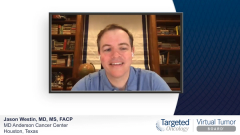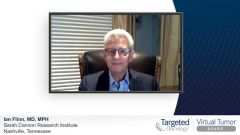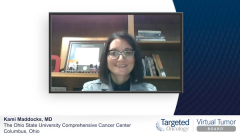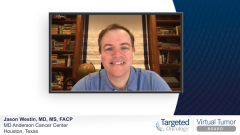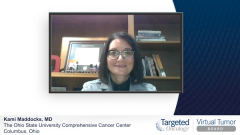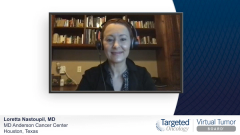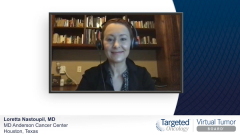
Case 1: Waiting for FISH Results in DLBCL
Kami Maddocks, MD: Does anybody treat without those FISH [fluorescence in situ hybridization] results and then possibly change care afterward? Or do you wait for the FISH results to come back? What’s your approach when you have a patient that … could potentially be positive, but the results are not that?
Ian Flinn, MD, MPH: For many patients, it takes a while to get the FISH back. We’re used to having rapid access to FISH in our tertiary care centers, but [for] a lot of the community hospitals it takes a long time for the results to come back. Community pathologists don’t have in-house FISH testing; they must send it out. They’re doing serial testing to define which group they’re going to do. And for many patients, I think they’re much better just going ahead and treating with R-CHOP [rituximab, cyclophosphamide, doxorubicin hydrochloride, vincristine sulfate, and prednisone]. Or you could treat with dose-adjusted R-EPOCH [rituximab, etoposide phosphate, prednisone, vincristine sulfate, cyclophosphamide, and doxorubicin hydrochloride], or something along those lines with first cycle, and then adjust your therapy thereafter. Because of the convenience, it’s probably easier just to treat with R-CHOP. It depends on how long you’re going to be waiting and how sick the patient is. I certainly wouldn’t wait for a long period of time for the FISH to come back before treating.
Jason Westin, MD, MS, FACP: I agree with Dr Flinn. I think that waiting is potentially harmful to the patient. If they get sicker and their disease begins to progress and now their performance status is limited, waiting for a test that may or may not be informative for your next steps, it’s better to start treatment and change. If you were to start R-CHOP, you could always change in future cycles to dose adjust at R-EPOCH if the patient did have translocations.
The confounder here of these adverse features, their relatively high IPI [International Prognostic Index], we all would love to do something better than R-CHOP for this patient because we know that this person doesn’t have an awesome prognosis with these adverse features. But the randomized trial of R-EPOCH versus R-CHOP didn’t show that there was a clear benefit to escalating therapy. There was a trend to the high IPI patients. In my practice we do give dose-adjusted R-EPOCH [etoposide phosphate, prednisone, vincristine sulfate, cyclophosphamide, and doxorubicin hydrochloride] to people who were fit that have bad features, but that’s not based on a clear win in a randomized trial, at the subset analysis of a big study. There’s not a wrong answer here of R-CHOP or R-EPOCH, but I think most people would use R-CHOP just … because of the convenience while waiting for those results.
Kami Maddocks, MD: Now we’re even seeing that most trials will actually allow 1 treatment of a cycle of therapy, be it R-CHOP or R-EPOCH, before getting patients on trial. … A sick patient needs treatment. It’s okay to pick 1 and then transition once you have the final FISH result.
Transcript edited for clarity.


